* Please note that the programme is still subject to minor updates/adjustments
23 OCTOBER
Venue: FEUP (rooms L3)
| 08:30 – 08:45 | Check-in of Participants | ||
| 08:45 – 10:00 | Climate Resilient Cities: Nature-based Solutions | Digital Trust & Cybersecurity | |
| 10:00 – 11:15 | Water Management | AI & Machine Learning | |
| 11:15 – 12:30 | Digital Health | Green Mobility | |
| 12:30 – 14:00 | Informal Lunch @Coffee Lounge | ||
| 14:00 – 15:15 | Food Security | Energy Resilience: Green Hydrogen | |
| 15:15 – 16:30 | Smart Industry | Healthcare | |
| 16:30 – 17:45 | CO2 Capture & Utilisation | Renewable Energy Communities | Antimicrobial Resistance: Sustainable Solutions for a Global Threat |
| 18:30 | Bus to Gala Dinner | ||
| 19:00 – 22:30 | Gala Dinner | ||
| 22:45 | Bus to Eurostarts Oporto Hotel and FEUP | ||
Climate Resilient Cities: Nature-based Solutions (08:45 – 10:00)
Climate resilient cities are essential in the face of escalating environmental challenges. They employ sustainable infrastructure, green spaces, and efficient water management systems to reduce vulnerabilities. At the core of climate reslilient cities are also nature-based solutions that harness the power of nature to address environmental challenges sustainably, using natural processes and ecosystems to address various societal challenges, particularly those related to environmental sustainability, climate change, and resilience. These shall be the broad topics that our panellists will be delving into, each from a different perspective, with an overarching aim to bring about a holistic approach to this theme.
Moderator: Eurico Neves, INOVA+
Panel:
João Cortesão, Sweco
Catarina Azevedo, RESIST
Pedro Soutinho, CEDES
In collaboration with project RESIST – Regions for climate change resilience through Innovation, Science and Technology

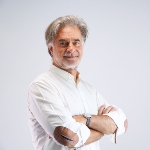
Eurico Neves is the Chairperson and Founder of INOVA+ S.A. a leading firm in innovation studies in Europe, and a founding member and former President of the Board of the Startup Europe Regions Network (SERN), an association gathering regional authorities in Europe for the promotion of startup-friendly policies, created under the sponsorship of the European Commission and the Committee of Regions. He is the author of two books and more than 30 international publications in the area of innovation and sustainable urban development and a consultant to the URBACT and Urban Innovative Actions of the European Commission and to the Mayors for Economic Growth programme of the UN Development Programme (UNDP). Eurico is a regular speaker on the topics of Innovation, Growth policies, EU policies, Urban and sustainable development, etc. He has been an invited key speaker at over 60 conferences at national and international levels.

João is Advisor on Climate Resilient Cities at Sweco Netherlands. He is passionate about connecting research and practice in the field of climate resilience. Throughout his 16-years international academic career he has developed spatial design solutions and policy advice for climate resilience, especially for urban areas. Currently, he acts as a pivot between business and science fuelled by the belief that bridging these two sectors is essential to address the climate crisis. Senior Research Associate of the 4TU Centre for Resilience Engineering, João is strong in providing advice for climate resilience-related challenges of different scales and complexity. His main goal is to generate and transfer knowledge to policy-makers, spatial design practitioners and society in order to facilitate the resilience of urban areas to current and future climate-related phenomena.

Catarina Pydzińska Azevedo, Senior Project Manager at INOVA+, is the Operational Coordinator of the RESIST project and works closely with 12 European regions on climate adaptation, to pilot innovative solutions and improve their resilience to climate change. She has a special interest in the area of citizen engagement and citizen science. Yet her experience is broader, as for over 20 years Catarina has been involved in numerous transnational projects and studies, especially ones funded by the European Commission and developed as services for its agencies. Catarina also supports the revival of the Polish CIVINET network, linked to the CIVITAS Initiative. She holds a Master’s degree in Management from Warsaw School of Economics, as well as a diploma of European Studies from its International Relations Institute, and is currently completing her PhD in Sociology at the University of Porto.

With a background in engineering, Pedro has extensive experience in international projects funded by the EU. He is a specialist in EU policies and programs. Currently, he is the Executive Director of CEDES, a non-profit organization focused on sustainable development, an evaluator of EU programs, and a lead expert for the URBACT program. Previously, Pedro worked at a consulting firm, supporting start-ups and SMEs in developing sustainable business models.
Digital Trust & Cybersecurity (08:45 – 10:00)
Digital trust and cybersecurity are intrinsically linked in today’s interconnected world. Digital trust refers to the confidence users have in the security, privacy, and reliability of online systems and services. Cybersecurity, on the other hand, encompasses the strategies, technologies, and practices designed to protect digital assets from cyber threats. In essence, without robust cybersecurity, digital trust cannot be established. Using, therefore, the first hand experience as case study, passing through the modus operandi of a company dedicated to providing an ethical hacking platform up to bringing it all together by addressing the cybersecurity market today, this panel shall surely be as gripping to the expert working in this domain as for the non-professional interested in knowing more and being better-protected as regards these issues at stake.
Moderator: Filipe Pereira, Inov@Legal
Panel:
Vitor Pinho, Ethiack
Joana Rodrigues, CISIV
Farid Singh, Nexwin/Startup Wise Guys

Filipe Manuel Pereira is currently the Director of Inov@legal – Institute for Legal and Technological Innovation in Portugal, Vice-President of Humanity of Things, a non-profit organization that fosters digital literacy, Vice-President of CCINP – Chamber of Commerce Netherlands Portugal and Managing Director at CARMA CPLP.
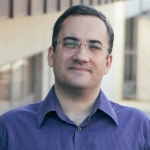
Vítor Pinho has a master’s degree in Information Security from the Faculty of Sciences of the University of Porto. Since then, he has focused on automation in the context of security testing and is currently Head of Hacking Automation at Ethiack. He is also involved in vulnerability research and pentesting, having contributed to CVEs and worked on vulnerability reporting with several organizations as well as participating in CTFs. Furthermore, he is also involved in Information Security Management Systems (ISMS) and respective compliance, being responsible for coordinating ISMS activities at Ethiack.

Joana’s education started with a BSc in Microbiology in UCP, followed by an MSc in Clinical Microbiology at the Barts & The London School of Medicine. Her professional journey began in academia as the lead researcher in a project on antibiotic resistance. Afterwards, she switched to Environmental Microbiology working for a global organisation as a scientist specialist in QA. In 2014, she joined Cisiv, a technology company that serves the life science industry by providing software solutions for observational and real world evidence studies. Starting as a Quality Manager she was responsible for ensuring the company’s policies and procedures were in line with all the relevant industry’s regulations. Joana complemented her background in clinical microbiology and quality assurance with courses in CSV and GAMP. In 2020, her responsibilities started having a stronger operational focus and after a hybrid role for a period of time, in 2021 her role became fully operational (Operations Director). Since 2022, Joana is Vice President of Operations, responsible for developing and maintaining delivery models for the different product offerings, working alongside the business leadership team.

Farid Singh is passionate about helping people succeed and solving problems. He is the founder of Technology and Innovation Consulting firm Take 3 Innovate, Entrepreneurship firm Nexwin OU, General Partner for Wise Guys Cyber Fund 1, and an Innovation Consultant for companies like Intel Corp USA, Prosegur Security and many more. He has over 15+ years of corporate experience and now spends his time between investing, innovation, startups and technology. He also gives Masterclasses on Building purposeful companies, Blue ocean strategy, Path to Product Market Fit, Experimenting and Building killer CX. He has worked with over 200 startups from all over the world in verticals from SaaS, Fintech, Cybersecurity, Defence AI and Sustainability. Farid has a deep technical background but also holds an MBA from INSEAD, A Bachelors Engineering degree and a Masters of Engineering from Leeds University UK. He is the Head Learning and Design Coach for programs at INSEAD which focus on Design Thinking, Creativity, Product Service design and Business Innovation. He is also a certified Blue Ocean Strategy Practitioner and helps companies overcome competition.
Water Management (10:00 – 11:15)
Water management encompasses a range of practices aimed at ensuring the sustainable use, distribution, and conservation of water resources. It involves the planning, development, and implementation of strategies to meet various water-related needs while addressing challenges such as scarcity, pollution, and climate change impacts. Effective water management includes measures like watershed management, water conservation, efficient irrigation techniques, wastewater treatment, and infrastructure development for water supply and sanitation. By prioritising integrated approaches and stakeholder engagement, water management aims to achieve equitable access to clean water, safeguard ecosystems, and support socio-economic development while promoting resilience in the face of emerging water challenges.
Moderator: Violeta Bulc, Ecocivilisation
Panel:
Eduardo Vivas, Aquaurb
Lígia Ramos, AdDP
Miguel Costa, FEUP

Dr.hc.Violeta Bulc, is the founder and curator of the Ecocivilisation movement. In less than four years, the movement under her leadership has grown into a global community that is already present in 46 countries and connects more than 2,500 active people in various fields that influence the co-creation of our common future and the present. Her career consists of different layers, which include the mandate of the European Commissioner for Transport, the position of Deputy Prime Minister and Minister for Cohesion and Development, a 14-year career as an entrepreneur, a 5-year career as a director in the field of telecommunications and a few years of an engineer’s career with extensive experience in the field of computing and informatics at home and abroad. She is the recipient of various national awards and prizes in the field of innovation and development of strategic business projects, publicist, author of the business bestseller Rhythms of Business Evolution and co-author of chapters in various books and professional publications. Her wide experience was richly supplemented by the Shaman Academy and the Academy of Martial Arts. She is an active member of many international professional and supervisory boards at the international, European and national level. She describes herself as a traveler through space and time, on the wings of curiosity and love.

With a degree and PhD in Civil Engineering, from FEUP, his professional activity of 20 years has always been linked to the area of Hydraulics, Water Resources, and the Environment, having included scientific research, teaching in higher education and consultancy in optimization of hydraulic systems. In 2024 he founded a new consultancy company, Aquaurb Engenharia, especially dedicated to studying solutions for the sustainability and resilience of the urban water cycle. He is also a member of the specialists committee on wastewater of Associação Portuguesa de Distribuição e Drenagem de Água (APDA) and of the specialists committee on water services of Associação Portuguesa de Recursos Hídricos (APRH). In APRH he had been the President of the North Regional branch, from 2016 to 2023, and is now the President of the North Regional Assembly.
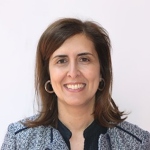
Civil Engineer at the Faculty of Engineering of the University of Porto and Master’s Degree in Hydraulics, Water Resources and Environment from the University of Coimbra. She began her professional career in the EDP Group in the Hydraulics Department, later moving to Águas do Douro e Paiva, SA, a water utility responsible for supplying water to about 1.8 million people in the greater Porto region. She has more than 20 years of experience in project management and construction of large water supply and wastewater treatment infrastructures. She led the Asset Management Team of Águas do Douro e Paiva and coordinated the implementation of the asset management system according to the ISO 55001 standard. She currently collaborates in the area of Innovation and represents the Portuguese Technical Committee 204 internationally, in the WG4 Group of the International Organization for Standardization, a group that manages the formal revision of the 55000 standard.
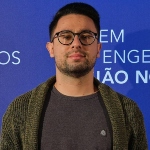
Miguel Costa is an Environmental Engineer, with a Master degree by the Faculty of Engineering of the University of Porto. Since 2017, he has been working as an Environmental Engineer and researcher at the Hydraulics, Water Resources and Environment Section of FEUP’s Civil Engineering Department, participating in various research and service providing projects. His main areas of activity include the management of water resources in extreme situations of drought, water scarcity and floods, especially in transboundary rivers of the Iberian Peninsula, as well as river hydraulics, river rehabilitation and definition of scenarios and assessment of the impacts of climate changes. His currently developing a PhD at FEUP in Environmental Engineering focusing on the management of prolonged drought and scarcity in an Iberian transboundary river basin. Miguel Costa is also a member of the Interdisciplinary Centre for Marine and Environmental Research (CIIMAR) of the University of Porto, of the Regional Council of the College of Environmental Engineering of the Order of Engineers – Northern Region (OERN), of the Specialized Water Services Commission (CESA) of the Portuguese Water Resources Association (APRH) and of the Monitoring Committee of FEUP’s Doctoral Programme in Environmental Engineering.
AI & Machine Learning (10:00 – 11:15)
AI and machine learning revolutionise how we interact with technology. By enabling computers to learn from data patterns, they can autonomously improve performance in various tasks, from predicting consumer behavior to diagnosing diseases. At the same time and while offering immense potential for innovation, AI also raises ethical concerns, including privacy breaches and algorithmic biases, lack of regulation and standards as well as the question of intensive energy consumption. These and many other questions are therefore at the center of this gripping Action Tank panel that counts with the participation of esteemed specialists representing respectively the academia, research centre as well as the private sector.
Moderator: Brígida Mónica Faria, ESS-IPP – P.PORTO
Panel:
Hugo Penedones, Inductiva.AI
João Ramos Pimenta, Promeneum

Brígida Mónica Faria is an Associate/Coordinating Professor in the Department of Biomathematics, Biostatistics, and Bioinformatics at the School of Health – Polytechnic Institute of Porto (ESS-P.PORTO). She is a researcher and a member of the Directive Board of the Artificial Intelligence and Computer Science Lab (LIACC) at the University of Porto (member of LASI – Associate Laboratory of Intelligent Systems). Brígida Mónica Faria holds a PhD in Computer Science from the University of Aveiro, an MSc in Multimedia Technology from FEUP, and a BSc degree in Mathematics from the FCUP. Her research interests include Machine Learning, Data Mining, Statistics, Data Analysis, Assistive Technology, Robotics, Multimedia and Serious Games. She participated in several research projects and developed fully functional prototypes in these areas. Throughout her career, she has organized 20 scientific events and belonged to the Program Committee of more than 50 scientific events. She is the author of more than 70 indexed publications (in SCOPUS and/or ISI Web of Knowledge) in international conferences and journals.
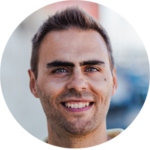
Hugo Penedones is co-founder and CTO at Inductiva Research Labs, a Portuguese startup developing a Python API for scientific computing, enabling scientists and engineers to run simulations of physical systems at scale. He holds a degree in Informatics and Computing Engineering from the Faculty of Engineering of Univ. of Porto and has worked as a Machine Learning researcher and engineer in the fields of computer vision, search, bioinformatics and reinforcement learning, at places such as the European Space Agency (Germany), Idiap and EPFL (Switzerland), Microsoft and Google DeepMind (London, UK).

João Ramos Pimenta is a professional with extensive experience in leading industrial companies, specializing in the implementation of growth strategies, innovation and operational efficiency with advanced information systems. He is currently the CEO of Promeneum, a group of companies that delivers solutions from strategy to automation to enhance overall organisational productivity. Its products and services combine state-of-the-art artificial intelligence algorithms, advanced robotics and artificial vision. He holds Bachelor’s and Master’s degrees in Electrical and Computer Engineering from the Faculty of Engineering of the University of Porto. He also completed a General Management Course at the Universidade Nova de Lisboa and pursued postgraduate studies in management at INSEAD and MIT.
Digital Health (11:15 – 12:30)
Digital health refers to the convergence of digital technologies with healthcare, aiming to improve the efficiency, accessibility, and quality of healthcare delivery. It encompasses a wide range of technologies, including telemedicine, wearable devices, mobile health apps, electronic health records etc. By leveraging data analytics and artificial intelligence, digital health has the potential to revolutionise diagnostics, personalised medicine, and population health management. However, it also poses challenges related to data privacy, security, interoperability, and equitable access to technology. What will be the approach that these panellist shall take in order to investigate the theme? Join the session and find out.
Moderator: Elísio Costa, FFUP
Panel:
David Facal, USC
Juan Jesús Garcia Domínguez, Alcalá University
José María Romero Fidalgo, ACIS
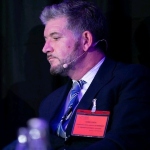
Professor at the Department of Biological Sciences of the Faculty of Pharmacy of the University of Porto and researcher in the Research Unit on CINTESIS – Center for Health Technology and Services Research. He is also the Director of the Competence Center on Ageing of the University of Porto, which aims to work as a convergence Centre of all the skills and knowledge of the University in the field of ageing; and coordinator of the activities of the University of Porto as an INNOSTARS RIS-Hub of EIT-Health. He was member of the European Innovation Partnership on Active and Healthy Ageing (EIP-AHA) on the Action Group A1 on Adherence to Prescription and Medical Plans, being the co-coordinator of one of the objectives of this Action Group.He is author of more than 250 publications (orcid.org/0000-0003-1158-1480) and has collaborated in national and international research projects in the field of chronic diseases, digital health and Active and Healthy Living (SACHI2; SKILLS4ADHERENCE; ICTSKILLS4ALL, FAIR4HEALTH, SHAPES, In-4-AHA, AGES, others).

David Facal has PhD in Developmental Psychology from the University of Santiago de Compostela (USC), 2008, with the PhD thesis “Tip Of the Tongue phenomena in aging: Influence of vocabulary, working memory and processing speed”, and Master Degree in Clinical Gerontology by the University of A Coruña. He was awarded the Humanitas Award 2007 by the Economical Social Council of the USC to their social labour as psychologist in AGADEA (Alzheimer’s Association of Santiago). He is professor at USC’s Department of Developmental Psychology since 2010, teaching at the Bachelor in Pedagogy and the Master in Psychogerontology. He is coordinator of the USC’s Master in Psychogerontology since 2020. He is the director of the Senior Innovation Lab, of which three editions have been held within the Inventhei and DeepInvethei projects. He is the principal investigator at USC in the Innov4Life project, within the European cross-border program Interreg Poctep.

Juan Jesús García Domínguez (IEEE SM’21) holds a degree in Telecommunications Engineering and a European PhD in Telecommunications Engineering from the University of Alcalá (Spain). He was awarded the best doctoral thesis in 2006. He joined the University of Alcalá in 1993 and has been a Full Professor in Electronic Technology since 2017. His research interests cover the areas of multisensory systems, positioning systems, and electronic and information technologies applied to transport. In the last decade, he has focused his research on ambient intelligence for independent living, applied to the early detection of the onset of physical and cognitive impairment in the elderly. He has participated in more than 80 research projects (30 as Principal Investigator) and has authored more than 200 publications in the field of sensory systems.
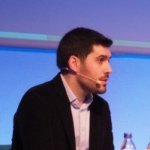
Degree in Business Administration and Management and Master in International Business Management. Since 2020, he is the Director of the Health Development and Innovation Area at the Galician Agency for Health Knowledge (ACIS), responsible for projects related to Innovative Public Procurement of the Galician Health Service (SERGAS), mobilizing over 30 million euros in the last 4 years. He represents Galicia in European networks and projects as a partner and leader in areas such as primary care, active and healthy aging, financing of public health systems, living lab model, among others.
Green Mobility (11:15 – 12:30)
Green mobility represents a shift towards sustainable transportation methods that minimize environmental impact. It encompasses various initiatives such as electric vehicles (EVs), public transportation systems powered by renewable energy, cycling infrastructure, and walkable urban spaces. By reducing reliance on fossil fuels and promoting cleaner alternatives, green mobility helps mitigate air pollution, decrease greenhouse gas emissions, and combat climate change. Additionally, it enhances urban livability, improves public health, and fosters economic growth through innovation and job creation in the renewable energy and transportation sectors. Come and hear what these experts will have to tell about the present and future of Green Mobility and engage in the wider discussion.
Moderator: Pedro Silva, i-charging
Panel:
Armando Araújo, FEUP
Nuno Maria Bonneville, GALP
Glenn Cezanne, CharIN
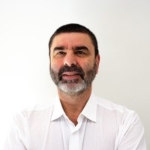
Pedro Moreira da Silva is Electric Engineer and additionally has MBA in Business Management. He is also a Specialist in Transports by the Portuguese Engineering Order and Member of the Board of ‘Associação Portuguesa do Veículo Eléctrico – APVE’. He has 39 years of professional experience of which the last 15 years in the electric mobility sector and is a founder of i-charging (founded in 2019), of which he is a Board member and CEO.

Armando Araújo received the Ph.D. degree in Electrical and Computer Engineering in 1998 from the University of Porto. Presently he is Assistant Professor in the Department of Electrical and Computer Engineering at the Faculty of Engineering of the University of Porto where he teaches courses in the areas of analog electronics, power electronics, automotive electronics and signal acquisition and processing within the Integrated Master in Electrical and Computer Engineering. He is involved with R&D in the fields of modeling, simulation, design and control of power electronic systems for electrical mobility and grid interface with renewable energy sources. His research activity is developed within the Research Center for Systems and Technologies (SYSTEC).
He is a member of the Portuguese Engineering Association.
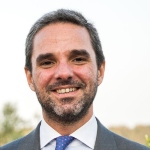
E-mobility enthusiast with over 20 years working in the sustainable mobility sector, performing managing roles, through all the phases of the business, from regulation, to development and operation. Vast international experience, working with worldwide top players in the electric mobility field and International regulators.

With a career focused on Public Affairs, Public Relations and Association Management on the international stage, Glenn understands the political decision-making landscape with the aim of creating effective communication strategies, whether it is to have an impact on a piece of legislation in the EU pipeline or to increase political attention on specific issues of interest to clients. He is Founder of Time&Place Consulting, headquartered in Brussels and with satellite offices in Germany, France, Italy, Brazil, India, Austria and Ireland. Two of the main clients are CharIN (representing the whole e-mobility eco-system) and the German Airports Association (ADV). Glenn speaks German, Romanian, Italian, English and French, and is working hard on improving his Portuguese.
Food Security (14:00 – 15:15)
Food security refers to the availability, access, and utilisation of safe and nutritious food for all individuals, having as an underlying goal protecting the global health. It is a multifaceted issue influenced by factors like agricultural productivity, economic stability, and social inequalities. Climate change, conflicts, and pandemics exacerbate food insecurity globally, affecting millions. Therefore, sustainable agriculture, resilient supply chains, and social safety nets play crucial roles in addressing this challenge. Closely linked to food security is also the question of food safety, the handling, preparation, and storage of food to prevent contamination and illnesses. Addressing these two sides of the coin is, therefore, under the scrutiny in this Action Tank session, involving as panel members esteemed stakeholders from different related sectors.
Moderator: Luciana Gomes, FEUP
Panel:
Ricardo Oliveira, INIAV
Sérgio Guedes Silva, UN World Food Programme
Laura Vicentini, SPINAGRO
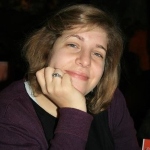
Luciana Gomes is an Assistant Professor at the Department of Chemical Engineering of the Faculty of Engineering of the University of Porto (FEUP) and a Senior Member of the Laboratory for Process Engineering, Environment, Biotechnology and Energy (LEPABE) and Associate Laboratory in Chemical Engineering (ALiCE) since November 2022. She graduated in Bioengineering and received a Ph.D. in Chemical and Biological Engineering from the University of Porto in 2016. During the last 5 years, Luciana Gomes has lectured courses on Quality and Security, Food Technology, Bioresources Engineering, Protein Engineering, and Biological Sciences. Her research interests include surface engineering to prevent biofilm formation, protective biofilms using probiotics, and the development of cleaning and disinfection methods for the food industry. She was a team member of the EU-funded SurfSAFE project (Grant agreement ID: 952471) and is the PI of the national BacAllFree project (Controlling bacteria and allergen contamination in the food industry using biomimetic surfaces).

Ricardo Oliveira – graduated in Biochemistry from the Faculty of Sciences of the University of Porto (FCUP) /Abel Salazar Institute of Biomedical Sciences (ICBAS) since 2015, having completed a period at the Stockholm University, Sweden (Erasmus+ program). Master in Biotechnology from the University of Minho (UM) since 2017, having carried out his master’s dissertation at the company Biomode SA. In 2018, he was awarded an FCT PhD scholarship for the development of aptamers for staphylococcal enterotoxins using nucleic acid mimics (NAMs) at the Faculty of Engineering of the University of Porto (FEUP) in collaboration with the National Institute for Agricultural and Veterinary Research, I. P. (INIAV). During this period, he was a visiting PhD student at the Department of Cell Biology and Molecular Genetics, University of Maryland, USA. He completed his PhD in Chemical and Biological Engineering in 2023. Currently, he is a PhD researcher at INIAV focusing on diagnostic and/or therapeutic solutions for food safety.

Sérgio Guedes Silva holds a master’s in mechanical engineering with a specialization in industrial management. He has seamlessly blended his technical acumen with a heartfelt commitment to humanitarian and development work from the early stages of his career. His previous work in the logistics sector within the private realm provided a platform for Sérgio to further hone his skills, which were later channeled into impactful roles at the United Nations’ World Food Programme (WFP – Nobel Peace Prize in 2020). Over a span of a decade at WFP, his contributions permeated various facets of supply chain management, initially within research and development, later transitioning to operations, leading a team focused on strategic planning and optimization. His work took him around the world, supporting key operations such as the Rohingya crisis in Bangladesh, the Mozambique floods, Sahel and Southern African droughts, and crises in Syria, South Sudan, and Afghanistan. Currently, Sérgio works in the WFP Strategic Partnerships Division, providing strategic support on partnerships with International Financial Institutions (IFIs) and governments. He fosters collaborative engagements centered around food systems, supply chains, and infrastructures.

Laura Testa Moura Vicentini is an agronomist and passionate about sugar cane. She produces pre-sprouted sugar cane seedlings at Spinagro, organic compost and the world’s first sustainable cachaça at Sô Zé Cachaça. All of these products are sustainable and internationally certified, guided by a circular and regenerative economy, which Laura and her husband, Rodrigo, proudly produce today in Batatais, São Paulo – Brazil.
Energy Resilience: Green Hydrogen (14:00 – 15:15)
Unlike grey hydrogen derived from fossil fuels, green hydrogen production emits zero greenhouse gases and therefore has great potential to decarbonise sectors like transportation and industry, it is considered as a cornerstone of sustainable energy transitions. However, challenges like high production costs and infrastructure limitations persist, requiring concerted efforts in research, policy, and investment to unlock its full potential as a key player in a carbon-neutral future. The invited experts certainly bring to the table new knowledge, insights and future prospects with regard to this exciting topic, often considered as the holy grail of green energy.
Moderator: Juan Portillo, LNEG
Panel:
Yury V. Kolen’ko, INL
Adélio Mendes, FEUP
Marco Ferraz, GALP
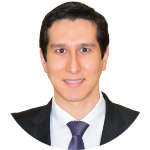
Juan Portillo holds a PhD in Sustainable Energy Systems from Instituto Superior Técnico, University of Lisbon (IST/ULisboa). He is a Mechanical Engineer with more than 20 years of experience in the energy sector. Half of them were in the Oil & Gas industry, where he worked for engineering consultancy companies and large companies like Petrobras and PDVSA GAS. He developed various roles in fields like process engineering, operations & maintenance, planning and control, strategic planning, and large gas projects’ supply management (in the order of thousands of millions of Euros). Since 2013, he has been researching sustainable energy systems for a Sustainable Economy, involving offshore renewables, hybrid systems and their integration, and hydrogen and its competitiveness. He currently works for the Resource Economics Unit at LNEG and is an invited Professor at IST/ULisboa.

Dr. Yury V. Kolen’ko is a Group Leader at the International Iberian Nanotechnology Laboratory, located in Braga, Portugal. He leads dynamic and interdisciplinary Nanochemistry Research Group, focusing on two complementary research lines: (1) Sustainable Solutions and (2) Energy Materials & Catalysis. The goal of the former is to discover or augment the current, emerging, and future sustainable solutions in the field of water treatment, air purification, circularity, raw materials, and manufacturing of added-value goods. The latter focuses on the development of unconventional catalytic, thermoelectric, photovoltaic, and magnetic nanomaterials to improve the material efficiency while reducing the dependence of the renewable energy sector on rare and expensive critical raw materials. Yury has authored >130 scientific articles, 3 book chapters, and filed 2 patent applications. He has also given >20 invited lectures at leading institutes, universities, and international conferences. Yury is currently coordinating two high-risk, high-impact European H2020 FET OPEN SpinCat project and HORIZON EUROPE PATHFINDER OPEN MemCat project.
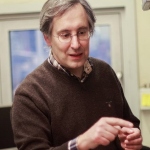
Professor Adélio Mendes (born 1964) received his PhD degree from the University of Porto in 1993. Currently is full professor at the Chemical Engineering Department of the Faculty of Engineering – University of Porto. Coordinates a large research team with research interests mainly in photovoltaic cells (DSSC and PSC), photoelectrochemical cells, electroreduction of CO2, batteries (RFB and SIB), fuel cells and electrolysis, chemical membrane reactors, methane splitting, green methanol, adsorption-based separation processes and carbon molecular sieve membranes. Professor Mendes authored or co-authored more than 460 articles in peer-reviewed international journals, filled more than 35 families of patents, and authored a textbook; he was the recipient of an Advanced Research Grant from the ERC on dye-sensitized solar cells for building integrated of ca. 2 M€, in 2013, led/leads several EU projects, namely two from the Future and Emerging Technologies program (FET); leads a large project on Green-Methanol of ca. 7 M€. 10 start-up companies co-owned by former or present researchers from his research team were created from his research activities.
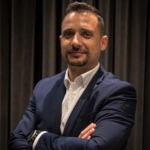
Marco Ferraz, Head of Upstream and Industrial Innovation Galp. Marco manages the Upstream and Industrial Innovation Center at Galp since 2020, with over 50 projects ongoing involving more than 800 researchers. Marco is also the chairman of CoLab Net4CO2, a research institution focused on finding sustainable solutions for CO2 management as well as invited lecturer of ISEG. He was previously a geologist at Galp E&P focused on seismic interpretation and geological modelling on both clastic and carbonate environments. Previously worked as a researcher on sedimentology, sequence stratigraphy and modelling for several institutions such as LNEG (Portugal) and USGS (USA) as an invited researcher at in a project co-developed with NASA in San Francisco. Holds a PhD in Geosciences from the University of Sydney, where he was also an associate lecturer and an MBA from Católica University.
Smart Industry (15:15 – 16:30)
Joining representatives from the academia, intergovernmental research centre and private sector, this panel session shall certainly do justice to the transformative paradigm we have become to address as Smart Industry or Industry 4.0. Smart industry, leverages advanced technologies like AI, IoT, and automation to optimise manufacturing processes. By connecting machines, devices, and systems, smart industry enables real-time data collection and analysis, improving efficiency, productivity, and decision-making. Predictive maintenance, agile production, and customised products are just a few benefits. Naturally, there are also present several challenges, for instance, its adoption requires significant investment, workforce upskilling, and cybersecurity measures. Yet, the promise of increased competitiveness and sustainability drives industries worldwide towards embracing it as the path forward.
Moderator: Gil Gonçalves, FEUP
Panel:
Brigita Jurisic, INL
Antoni Pijoan, EIT Manufacturing West
Miguel Ribeiro, Smartex
Leonardo Dicker, XR.Lab

Gil Gonçalves is an Assistant Professor at FEUP and a researcher at SYSTEC, with more than 20 years of experience in systems development, specialising in systems engineering, control architectures and design of software for industrial applications. Gil coordinates the Digital and Intelligent Industry Research Lab, and he is not only an experienced academic and researcher but also a recognised innovation and entrepreneurship expert. Principal researcher (PI) in several European and Portuguese R&D projects, Gil is also a member of the Portuguese National Network of Mentors for Young entrepreneurs and co-founder of 4 technology-based start-ups.
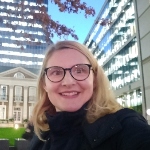
Brigita Jurisic, a Business and Strategic Relations Officer at International Iberian Nanotechnology Laboratory based in Braga, Portugal, is steering a Horizon Europe project FORGING, uncovering the potential of emerging enabling technologies for the twin (green & digital) transition. Brigita has experience running an international business consultancy working across a variety of geographies and industries. She has worked in technology transfer at Tecminho, Portugal, and City, University of London, UK, where she sourced funding for taking the technologies from lab to the market and managed Industrial Doctoral Training Centres in AI and Cyber Security. At the University of East London, she oversaw entrepreneurship education and managed a business and innovation centre. Brigita holds a BA in Psychology and a MA in Marketing and Strategic Management.

Bachelor’s Degree in Physics Science at the University of Barcelona (1994) and Industrial Engineer at the Polytechnic University of Catalonia/University of Aberdeen (1998). Executive MBA (2008). After more than 20 years of international career developed in Spain, France, UK, Germany and USA working in engineering and consultancy, Antoni joined EIT Manufacturing in 2019 as Interim Director of Business Creation and finally Managing Director of EIT manufacturing West. Previously he worked at Tecnalia and its affiliated Tecnalia Ventures promoting, selecting (conducting due diligences) and mentoring new tech-based Business Opportunities, and leading technology transfer projects. He had been member of different governing bodies such as Nobatek (RTO in Southern France), EIT InnoEnergy and EIT Health.

Miguel Ribeiro is currently the Research and Development Director at Smartex.ai. He leads the innovation projects to develop new technologies for the textile industry, with a strong focus on artificial intelligence, machine vision and sustainability. He has vast experience in R&D in academic and industrial settings, having previously been the Director for R&D at Neutroplast and R&D Manager at CeNTI – Centre for Nanotechnology and Smart Materials. He has specialised in artificial intelligence, machine vision and sustainability, knowledge transfer, intelligent materials, printed electronics and smart textiles.
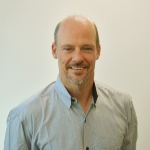
Leonardo Dicker, CPO of XR.Lab. Master’s in Business Administration from FUMEC University, postgraduate in Business Management from Fundação Getúlio Vargas, and Architect from the Federal University of Minas Gerais (UFMG). Certified in MySQL and MaxDB, having participated in training in England and Germany. Speaker and guest mentor at various events related to startups, innovation, and technology. Director of International Business at FUMSOFT, responsible for organizing and participating in various fairs, missions, and international events, as well as liaising with foreign companies, accelerators, and investment funds. CPO at XR.Lab Group since 2022, being responsible for products and projects using Extended Reality for training and inspection for Energy, Mining and other sectors.
Healthcare (15:15 – 16:30)
Healthcare, a fundamental aspect of human well-being, encompasses a broad spectrum of services aimed at promoting, maintaining, and restoring health – from preventive measures to specialised treatments, healthcare addresses diverse needs across populations. Yet, inherent challenges such as rising costs, disparities in access, and aging populations require innovative solutions and collaborative efforts between governments, healthcare providers, and communities. The big questions linked to the accessibility, affordability, and quality of care shall therefore be in the agenda of this Action Tank, crosscutting between subtopics like medical technology, treatments, and public health strategies.
Moderator: Patrícia Patrício, Health Cluster Portugal
Panel:
José Bastos, knokcare
Isabel Ramos, Novo Nordisk
Paulo Santos, CINTESIS/PrimeCare, FMUP
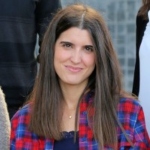
Patrícia Patrício holds a degree in Applied Biology, a master’s degree in Molecular Genetics and Biomedicine from the NOVA University in Lisbon and a postgraduate degree in Management from the Instituto Universitário da Maia (ISMAI). She holds a Ph.D. in Health Sciences, from the University of Minho, where she also developed a post-doctorate in partnership with international universities. She has published over 30 scientific articles in international journals and presented her work at numerous national and international conferences. Her training also includes entrepreneurship, project management, technology transfer and clinical research. She is the co-founder of Bn’ML – Behavioral & Molecular Lab, a company she established in 2012. Bn’ML develops preclinical research services for drugs and medical devices. She is a National Director of the Portuguese Association of Young Entrepreneurs (ANJE) and a member of the Board at B.acis – Center for Health Innovation at the Medical School of the University of Minho, since 2020. In January 2020, Patrícia joined the executive team of Health Cluster Portugal, where she currently serves as Innovation Director.

As co-founder & CEO of knok, his goals include empowering every person on the planet to have access to quality and affordable health care. José has a degree in Management from the University of Porto and a Mergers and Acquisition Programme from the University of Chicago – Booth. He is fluent in Portuguese, English, French, Italian, and Spanish. Before knok, he worked for 17 years in Finance and Strategic Planning at a multinational. He has managed international and multicultural teams and developed businesses in a global context.

Dr Isabel Ramos has an MSc in Bioengineering from the University of Porto and a PhD in Cardiovascular Imaging from King’s College London. Currently she is part of the London Digital Innovation Hub for Novo Nordisk where she works as an Open Innovation Consultant driving strategic Fast Track Innovation programs across 14 European countries. Previously, as Innovation Manager for Digital Health at Siemens Healthineers, she managed AI-related product development projects and collaborated closely with key universities and hospitals in London. She also worked in tech transfer offices, first at Imperial Innovations and then at The Francis Crick Institute, where she facilitated the commercialization of research discoveries through industry collaborations and IP protection. Passionate about digital health innovation she is dedicated to modernising healthcare by collaborating with dynamic and forward-thinking teams.
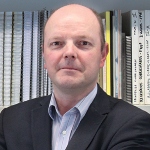
Graduate in Medicine by the Faculty of Medicine of the University of Porto, Portugal. Doctorate in Clinical Investigation and Health Services Research (2014), by the Faculty of Medicine of the University of Porto, Portugal, with habitation since 2022. Doctor specialist in Family Medicine and General Practice, with special skills in Geriatrics, at the Hospital Privado de Gaia. Senior researcher of PrimeCare: Primary Care Research Group of CINTESIS@RISE – Center for Health Technology and Services Research, dedicated to primary health care research and development. Associate professor of Preventive Medicine, General & Family Medicine, and Medicine of Community, at the Department of Community Medicine, Information and Health Decision Sciences of the Faculty of Medicine of the University of Porto, Portugal.
CO2 Capture & Utilisation (16:30 – 17:45)
CO2 Capture & Utilisation (CCU) offers a dual solution to combat climate change. By capturing carbon emissions from industrial processes or directly from the air, CCU not only mitigates environmental harm but also transforms CO2 into valuable resources like fuels, chemicals, and building materials. This innovative approach not only reduces greenhouse gas emissions but also fosters a circular economy, creating economic opportunities while safeguarding the planet. The invited experts of this panel shall delve deep into this important technology/methods, each presenting their case, and while doing so, also engage the audience to broaden the discussion.
Moderator: Leonel Nunes, Capwatt
Panel:
Marco Ferraz, GALP
Cláudio Rocha, FEUP
Graça Gomes, Lowjoule

Leonel Jorge Ribeiro Nunes holds a PhD in Industrial Engineering and Management from the University of Beira Interior, as well as a PhD in Agricultural and Environmental Sciences from the University of Évora and the University of Algarve. He previously earned Bachelor’s degrees in Geology from the Department of Earth Sciences at the Faculty of Science and Technology of the University of Coimbra, in Geology from the Department of Earth Sciences at the School of Sciences of the University of Minho, and in Engineering Sciences – Mining and Geoenvironmental Engineering from the Department of Mining Engineering at the Faculty of Engineering of the University of Porto. He also holds Master’s degrees in Hydraulics and Water Resources from the Instituto Superior Técnico of the University of Lisbon and in Geological Engineering from the Department of Earth Sciences at the Faculty of Science and Technology of the University NOVA of Lisbon. He has 25 years of professional experience in industry, primarily in the fields of environmental management, extractive industries, and renewable energies. Currently, he serves as an Assistant Professor at the Polytechnic University of Viana do Castelo and as Biomass Supply Chain Manager at CapWatt. He is the author or co-author of various publications, primarily in the scientific fields related to biomass energy, energy products supply chain management, sustainability, circular economy, climate change, and biomass thermochemical conversion technologies.

Marco Ferraz, Head of Upstream and Industrial Innovation Galp. Marco manages the Upstream and Industrial Innovation Center at Galp since 2020, with over 50 projects ongoing involving more than 800 researchers. Marco is also the chairman of CoLab Net4CO2, a research institution focused on finding sustainable solutions for CO2 management as well as invited lecturer of ISEG. He was previously a geologist at Galp E&P focused on seismic interpretation and geological modelling on both clastic and carbonate environments. Previously worked as a researcher on sedimentology, sequence stratigraphy and modelling for several institutions such as LNEG (Portugal) and USGS (USA) as an invited researcher at in a project co-developed with NASA in San Francisco. Holds a PhD in Geosciences from the University of Sydney, where he was also an associate lecturer and an MBA from Católica University.

Cláudio Rocha, 30 years old, is a Chemical Engineer with a PhD in Chemical and Biological Engineering from the Faculty of Engineering of the University of Porto. His research focuses on sustainable technologies, particularly in green hydrogen production and CO2 capture. He is currently a Junior Researcher at LEPABE (FEUP), where he is involved in projects about CO2 methanation and steam reforming of wastewaters (e.g., olive oil mill wastewater), using multifunctional reactors. He leads the Hydroazeite project and he is a research member of the CYCON project (related with the Air Liquide Scientific Challenge 2023).
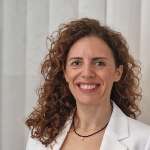
Graça is a professional energy and carbon auditor focusing on business models essential for the industry’s energy transition. Its 15 years of experience includes supporting hard-to-abate industrial sectors, textiles, ceramics, wood, food and beverages, and others, providing strategic responses to evolving trends in the energy sector, covering energy efficiency, CHP plants, hydrogen production, CCU – carbon capture utilization and renewable electricity generation. Its skills combine the development and implementation of green project strategies and technical-economic investment decision support. Her background in technical and commercial roles enhances her ability to support industry partners.
Renewable Energy Communities (16:30 – 17:45)
The specialists invited for this Action Tank panel address the increasingly salient topic of Renewable Energy Communities (RECs). REC initiatives empower local communities to take control of their energy production and consumption and harness renewable sources like solar, wind, and hydroelectric power to generate clean energy locally. By fostering community ownership and participation, RECs promote energy independence, resilience, and sustainability. They also create economic opportunities, encourage social cohesion, and contribute to the global transition towards a cleaner, greener future.
Moderator: Bernardo Silva, FEUP
Panel:
Francisco Vieira, GALP
José Luís Malaquias, CLEANWATTS
Marco Alves, MTX Solar

Bernardo Silva is MSc in Electrical and Computer Engineering and PhD on Sustainable Energy Systems, both from FEUP. He is Assistant Professor in the Department of Electrical and Computer Engineering at FEUP and senior researcher and Area Leader for Renewables Integration at the Centre for Power and Energy Systems at INESC TEC. For the last 15 years he has been involved on several R&D projects related with power systems operation with high share of renewables. He has been also actively contributing on consultancy studies for energy promoters and governmental bodies around the world. From 2016 to 2022 he was Portuguese representative on the Committee B4 (HVDC) of Cigré. He has awarded Honourable Mention – 2009 REN Award – MSc thesis and winner of the APREN 2016 Award with the PhD thesis.

Francisco Vieira is a Project Manager of Energy Communities at Galp, an Integrated Energy Company in Portugal. With over five years of experience in the energy sector, Francisco has been spearheading initiatives since 2023 to position Galp as a significant player in the evolving energy communities market. Prior to this role, Francisco served as a strategy consultant in Galp’s strategy department, where he focused on emerging energy market trends and future energy outlooks. He is currently immersed in studying the energy communities market in Portugal, understanding its importance within Galp, and defining Galp’s role in this emerging market. His work aims to ensure Galp remains at the forefront of innovation and leadership in the energy sector.

José Luís Malaquias holds an Engineering Degree in Physics and a M.Sc. In technological physics. He taught for 10 years at the University of Coimbra (Physics Department), in topics related to biomedical engineering. He was Innovation Director for Intelligent Sensing Anywhere, where he wrote or co-wrote over 30 successful R&D proposals, going back to the seventh framework programme. He was a researcher for RC Soft, where he developed IoT technology. He was the head of IT and machine maintenance for PMM, an injection moulding company. He was a researcher at Withlogik, an IoT company, where he developed electronic and software solutions for the moulding industry. He was an IoT researcher for Loop Future, where he developed a water pipe monitoring system. Currently, he is an Innovation Advisor for Cleanwatts Digital. In parallel, since 2012, he has maintained an independent activity as a corporate research and innovation consultant.

Marco is an executive director and cofounder of MTX Solar, a player of the solar industry based in Portugal. With a strong track-record and experience in Full Asset Management for Energy generating assets, sustained from working in Leading Functions in Top-Tear companies: Martifer Solar for the Solar Industry, ABB Full Service for industrial Asset Management and Transdev-Veolia for light rail business management with international experience. Marco has an MBA in Management and a Licentiate degree in Electrical Engineering at FEUP.
Antimicrobial Resistance: Sustainable Solutions for a Global Threat (16:30 – 17:45)
Infectious diseases are a global concern for public health, mainly due to the current antibiotic resistance crisis. About 1.3 million people worldwide die of resistant bacterial infections each year and an additional 10 million deaths are expected each year by 2050. The Food and Drug Administration has not approved a new antibiotic since 2019 and, the need for new solutions to detain antibiotic resistance is urgent and requires specific and effective actions. Therefore, this Action Tank aims to provide chemical, biotechnological and entrepreneurial views on how to tackle this global challenge.
Moderator: Manuel Simões, FEUP
Panel:
Stefan Schillberg, Fraunhofer IME
Jean-Christophe Cintrat, CEA
João Transmontano, Finao Bioetch
Olívia Rocha, KPMG
In collaboration with the project InnoAntiBiofilm – Boosting Sustainable Innovation in Developing New Antibiotic Adjuvants to Control Biofilm Resistance
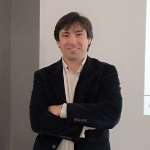
Manuel Simões is an Associate Professor with Habilitation at the Department of Chemical Engineering -Faculty of Engineering – University of Porto and a senior researcher at LEPABE-ALiCE research centre. His main research interests involve the development of microbial control strategies with innovative molecules.

Prof. Schillberg, Executive Director at the Fraunhofer Institute for Molecular Biology and Applied Ecology IME, leads the Institute for Molecular Biotechnology at RWTH Aachen University. With over 30 years in biotechnology, he focuses on contained environmental agriculture, recombinant protein production, and scale-up strategies. Author of 200 publications and patents, his work aims to translate R&D into industrial applications, with notable projects in plant stem cells for cosmetics, tobacco cell-based expression systems, and innovative vertical farming concepts.

Trained as an organic chemist (PhD, Nantes University, 1995), Dr. Cintrat completed a postdoc in natural product synthesis at Amsterdam University. At the French CEA, he worked on deuterium/tritium labeling and radiolabeled probes, later managing scientific platforms and leading the high-throughput screening platform and medicinal chemistry team. Since 2018, he has directed the chemical biology lab at Paris Saclay University, focusing on photosensitizers for photocatalysis and photodynamic therapy, and developing drug candidates for various therapeutic areas. In 2023, he became head of the new “Laboratoire de Chimie Bio-Organique.”

Graduated in Pharmacy by the University of Lisbon, PhD by the ETH Zurich, post-Doc in Pharmaceutical Medicine at the ECPM-Basel, Professor of Global Business Strategy, Ethics and Leadership in S. Diego, CA, MBA in Marketing. He started his career in Regulatory Affairs, Business Development, Area Management in companies such as Sandoz, Mepha and Vifor AG and was consultant to Kemin Foods, USA. Lead biopharmaceutical projects in PR China. Served as Director of Abiquifi (Brazilian Pharmochemical Industry Association) and also in other professional associations. Speaks fluently 6 languages. Currently serves as CEO of Finao Biotech in Portalegre-Portugal dedicated to human health and biotechnology with a global reach. Is also a member of the board of Neovictus and Portus Pharma.
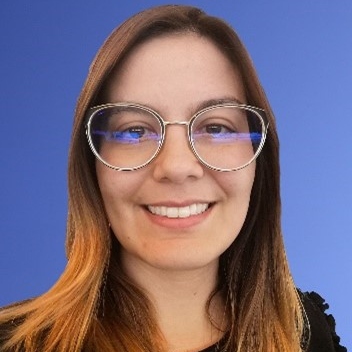
Olívia Rocha is a Senior Manager for EU funding at KPMG Portugal. She has gained valuable experience working at Research and Technology Organisations, SMEs, and large corporations, and is now applying her expertise at a Big 4 firm. She has significant experience in managing international funding across diverse technology areas and served as an expert evaluator for the European Commission from 2014 to 2019. Olívia is a specialist in incentives, overseeing the management and implementation of both national and international R&D&I projects, with a particular focus on FP7, Horizon 2020 and Horizon Europe programmes. Holding a master’s degree in chemical engineering from the Faculty of Engineering of the University of Porto, she is well-versed in fostering synergies between European Technology Platforms and has been involved in shaping international R&D work plans for almost two decades. In addition to her funding expertise, she engages in knowledge transfer and strategic cooperation with companies, from start-ups to large corporations, helping them internationalise and optimise incentives in collaboration with KPMG’s global network.



